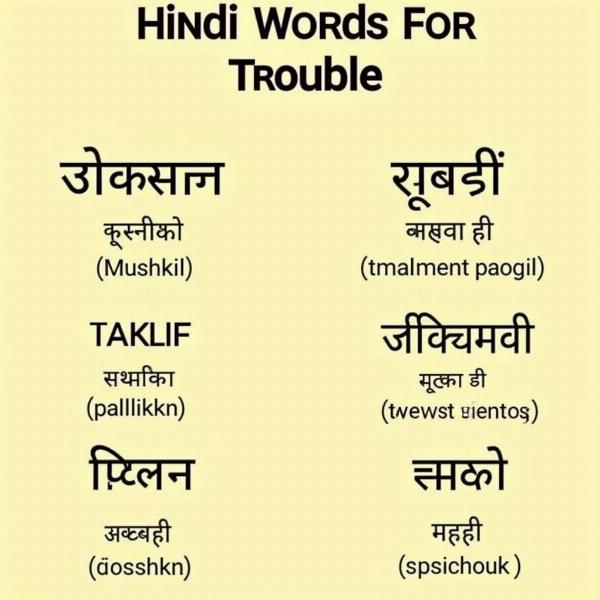Understanding the meaning of “trouble” in Hindi can be nuanced, as there isn’t one single perfect equivalent. The best translation depends on the specific context and the kind of trouble you’re referring to. Whether it’s a minor inconvenience or a serious predicament, this article will explore the various ways to express “trouble” in Hindi, delving into the subtleties of each term and providing practical examples to help you choose the most appropriate word.
Common Hindi Words for “Trouble”
Several Hindi words capture different aspects of “trouble.” Here are some of the most common ones:
-
Mushkil (मुश्किल): This is perhaps the most versatile and widely used translation for “trouble.” It encompasses a broad range of difficulties, from minor problems to significant challenges. For instance, “I’m having trouble with my car” can be translated as “Mujhe apni car mein mushkil ho rahi hai (मुझे अपनी कार में मुश्किल हो रही है).”
-
Pareshani (परेशानी): This word signifies worry, annoyance, or distress. It’s often used for situations causing inconvenience or anxiety. “I’m having trouble sleeping” can be expressed as “Mujhe sone mein pareshani ho rahi hai (मुझे सोने में परेशानी हो रही है).”
-
Taklif (तकलीफ): This word refers to pain, discomfort, or hardship. It’s generally used for physical or emotional suffering. “I’m having trouble breathing” can be translated as “Mujhe saans lene mein taklif ho rahi hai (मुझे साँस लेने में तकलीफ हो रही है).”
-
Samasya (समस्या): This word translates to “problem” and is suitable for more formal contexts or when referring to a specific issue. “We’re having trouble with the new software” can be expressed as “Hamein naye software ke saath samasya ho rahi hai (हमें नए सॉफ्टवेयर के साथ समस्या हो रही है).”
-
Kasht (कष्ट): This word denotes suffering, pain, or difficulty, often implying a more severe or prolonged hardship. It carries a stronger connotation than “taklif.”
 Hindi Word for Trouble
Hindi Word for Trouble
Choosing the Right Word: Context is Key
The best Hindi word for “trouble” depends heavily on the context.
- For everyday inconveniences, “mushkil” or “pareshani” are usually appropriate.
- For physical or emotional suffering, “taklif” or “kasht” might be more fitting.
- For formal situations or when discussing specific problems, “samasya” is a good choice.
Trouble in Idiomatic Expressions
Hindi, like English, uses “trouble” in various idiomatic expressions. For example:
-
“Apne pair par kulhadi marna” (अपने पैर पर कुल्हाड़ी मारना): This literally translates to “to axe one’s own foot” and means to invite trouble upon oneself.
-
“Aag mein ghee dalna” (आग में घी डालना): Meaning “to add ghee to fire,” this idiom describes exacerbating an already troublesome situation.
What if I’m Still Having Trouble?
If you’re still unsure which word to use, consider consulting a Hindi dictionary or language learning resource. You can also meaning of dishant in hindi or other words. Don’t be afraid to ask native Hindi speakers for help – they can offer valuable insights and help you navigate the nuances of the language. Remember, practice is key to mastering any language.
Conclusion
Understanding the meaning of “trouble” in Hindi requires understanding its various nuances. By choosing the right word based on the context and using idiomatic expressions appropriately, you can communicate effectively and avoid misunderstandings. i am not getting you meaning in hindi if you need to express this kind of sentiment. This exploration of “trouble” in Hindi allows you to express yourself with greater precision and cultural sensitivity.
FAQ
- What is the most common Hindi word for “trouble”? Mushkil is generally the most common and versatile word.
- How do I choose the right word for “trouble” in Hindi? The context is crucial; consider the specific type of trouble you’re referring to.
- Are there any idiomatic expressions involving “trouble” in Hindi? Yes, many! Two examples are “apne pair par kulhadi marna” and “aag mein ghee dalna.”
- Where can I find more help with Hindi translations? Dictionaries, language learning resources, and native Hindi speakers are all valuable resources.
- Is taklif the same as kasht? While both relate to suffering, kasht often implies a more severe or prolonged hardship.
Meaning-Hindi.in offers professional translation services specializing in Hindi and other languages. We cover various fields, including business, legal, technical, website localization, and academic translations. Whether you need body movement meaning in hindi or payment declined meaning in hindi, we can help. For accurate and reliable translations, contact Meaning-Hindi.in at [email protected] or +91 11-4502-7584. bading meaning in hindi can also be found on our website.